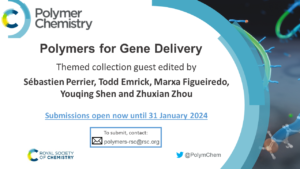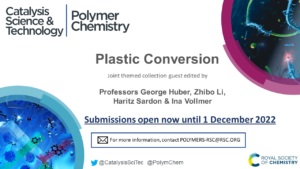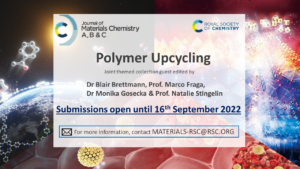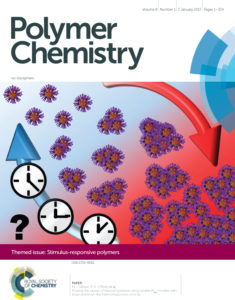We are delighted to welcome submissions to a Polymer Chemistry themed collection on Data Science and Machine Learning in Polymer Research, guest edited by Professor Nicholas Warren (University of Sheffield) and Professor Ying Li (University of Wisconsin-Madison).
Polymer science encompasses a vast design space of molecular structures, processing conditions, and resulting properties which is ripe for revolutionization through the integration of Artificial Intelligence (AI) and Machine Learning (ML). This special issue explores the exciting intersection of these two dynamic fields, showcasing cutting-edge research and highlighting the transformative potential of AI/ML across the spectrum of polymer science.
From accelerating materials discovery and optimizing polymer synthesis to predicting structure-property relationships and enabling advanced characterization, AI/ML is rapidly becoming an indispensable tool for researchers. This special issue delves into these advancements, covering key areas such as:
- Polymer Design and Discovery: Exploring how AI/ML algorithms are being employed to design novel polymers with targeted properties, predict their performance, and accelerate the search for next-generation materials.
- Polymer Synthesis: Showcasing the application of AI/ML in optimizing polymerization reactions, controlling processing parameters, and predicting the resulting polymer architectures and morphologies.
- Polymer materials properties: Highlighting the use of ML to establish robust connections between polymer structure, morphology, and macroscopic properties. This encompasses predicting mechanical properties, thermal behaviour, and other key characteristics from molecular descriptors and simulation data.
- Polymer Characterization: Featuring the implementation of AI/ML in analyzing complex datasets from various characterization techniques (e.g., spectroscopy, microscopy, scattering) to extract meaningful information and accelerate data interpretation.
- Theoretical and Computational Polymer Science: Exploring the use of AI/ML to enhance theoretical models and simulations of polymer systems, enabling more accurate predictions of polymer behaviour and facilitating the development of new theoretical frameworks.
This special issue aims to provide a comprehensive overview of the current state-of-the-art in AI/ML-driven polymer science, while also highlighting future directions and challenges. We invite contributions that showcase innovative applications of AI/ML, demonstrate the potential for significant advancements in the field, and inspire further exploration of this exciting frontier. Ultimately, this special issue aims to catalyze the integration of AI/ML into all aspects of polymer research, ushering in a new era of accelerated discovery and innovation in polymer science.
This special collection is open for submissions until 30th November 2025.
If you are interested in submitting, please do so via our online submission system and mention in the ‘comments to the editor’ that your work is in response to the the open call for the data science in polymer research collection.





























